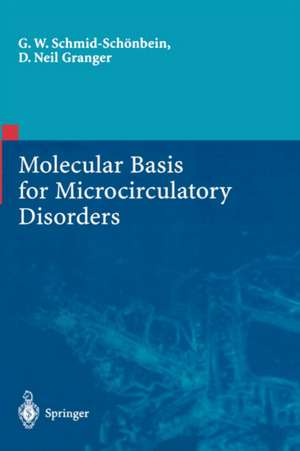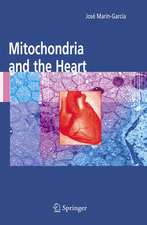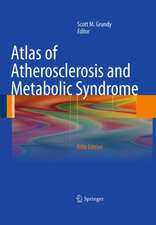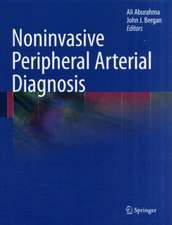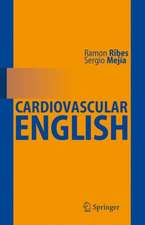Molecular Basis for Microcirculatory Disorders
Autor Geert W. Schmid-Schönbein, D.Neil Grangeren Limba Engleză Hardback – 19 feb 2003
| Toate formatele și edițiile | Preț | Express |
|---|---|---|
| Paperback (1) | 734.74 lei 6-8 săpt. | |
| Springer – 13 iul 2013 | 734.74 lei 6-8 săpt. | |
| Hardback (1) | 742.04 lei 6-8 săpt. | |
| Springer – 19 feb 2003 | 742.04 lei 6-8 săpt. |
Preț: 742.04 lei
Preț vechi: 781.08 lei
-5% Nou
Puncte Express: 1113
Preț estimativ în valută:
142.01€ • 146.70$ • 118.19£
142.01€ • 146.70$ • 118.19£
Carte tipărită la comandă
Livrare economică 26 martie-09 aprilie
Preluare comenzi: 021 569.72.76
Specificații
ISBN-13: 9782287005039
ISBN-10: 228700503X
Pagini: 640
Ilustrații: XV, 625 p.
Dimensiuni: 156 x 234 x 31 mm
Greutate: 1.07 kg
Ediția:2003
Editura: Springer
Colecția Springer
Locul publicării:Paris, France
ISBN-10: 228700503X
Pagini: 640
Ilustrații: XV, 625 p.
Dimensiuni: 156 x 234 x 31 mm
Greutate: 1.07 kg
Ediția:2003
Editura: Springer
Colecția Springer
Locul publicării:Paris, France
Public țintă
ResearchCuprins
1. Molecular Mechanisms of Leukocyte Adhesion.- 2. Leukocyte Adhesion Mechanisms in Chronic Inflammatory Disease.- 3. Endothelial-Dependent Mechanisms of Monocyte Recruitment.- 4. Adhesion and Communication Between Lymphocytes and Endothelial Cells.- 5. Steady and Unsteady Fluid Shear Control of Atherosclerosis.- 6. Fluid Shear Response in Leukocytes.- 7. Fluid Shear Stress Control of Vascular Smooth Muscle.- 8. Molecular Mechanisms of Juxtacrine Cell Signalling in Microvascular Responses and Inflammation.- 9. Microvascular Effects of the Heme Oxygenase-CO System.- 10. Reactive Oxygen and Nitrogen Species:Activating Signals in Inflammation.- 11. Mechanisms for Microvascular Cell Activation: Pancreatic Digestive Enzyme Derived Inflammatory Mediators in Shock.- 12. Regulation of Neutrophil Apoptosis.- 13. Endothelial Cell Apoptosis Under Fluid Flow.- 14. Mechanisms of Parenchymal Apoptosis.- 15. Molecular Determinants of Reperfusion-Induced Leukocyte Adhesion.- 16. Risk Factors for Cardiovascular Disease Amplify Reperfusion-Induced Inflammation and Microvascular Dysfunction.- 17. Early and Late Preconditioning Prevent Ischemia/Reperfusion Injury:Signalling Pathways Mediating the Adaptive Metamorphosis to a Protective Phenotype in Preconditioned Tissues.- 18. Oxygen Radicals and Pathogenesis of Stroke.- 19. Roles of Polymorphonuclear Leukocytes in Focal Cerebral Ischemia.- 20. Role of Endothelium in Cerebral Ischemia.- 21. Leukocyte-Endothelial Interactions Following Myocardial Ischemia.- 22. Ischemic Preconditioning and Apoptosis in Myocardial Ischemia.- 23. Gene Transfer Strategies and Therapeutic Applications for Cardiovascular Ischemic Diseases.- 24. Inflammation in Venous Disease.- 25. Microvascular Mechanisms Controlling CVI.- 26. Microvascular Adhesion Mechanisms inChronicVenous Insufficiency:a Pharmacological Approach.- 27. Microvascular Pathobiology in Diabetes.- 28. Microvascular Permeability in Diabetes.- 29. Involvement of Leukocytes in Diabetic Retinopathy and Choroidopathy.- 30. Diabetic Microangiopathy.- 31. Hypertension and Microcirculation.- 32. Microcirculation in Hypertension.- 33. Pharmacological Improvement of the Microcirculation.
